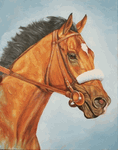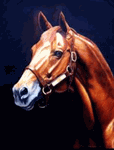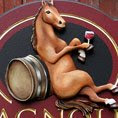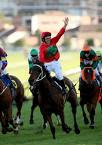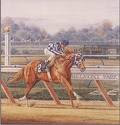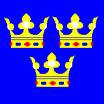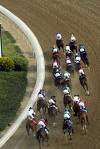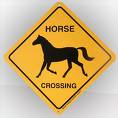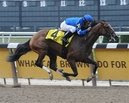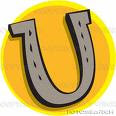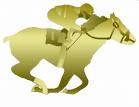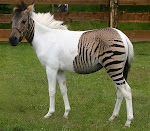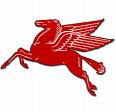I wanted to pay tribute to a Legend, a Whale, a Punter!
Alan Woods has used computer technology to become one of the world's most successful gamblers. but it isn't always a sure thing.


A few photos & printed stories to remember him by!
January 28, 2008
The world's most successful horse-racing gambler, Australian Alan Woods, died in Hong Kong on Saturday night.
The world's most successful horse-racing gambler, Australian Alan Woods, died in Hong Kong on Saturday night.
Woods, 62, recently diagnosed with appendiceal cancer, is believed to have suffered a pulmonary embolism. He had begun chemotherapy treatment two weeks ago and passed away in the intensive care unit of the Sanitorium Hospital at Happy Valley in the presence of family and friends.
Born in 1945 in Murwillumbah, New South Wales, Woods showed an early aptitude for mathematics at school but was a losing punter in his earliest days at university and gambling played little part in his life until his 30s.
Working as an actuary in the late 1970s, Woods learned to count cards at blackjack and became a serious gambler for the first time in his life, travelling the world for three years as a professional card counter and undertaking all kinds of disguises and subterfuge to avoid identification by the world's casinos.
But his earnings at blackjack were tiny compared with his subsequent career in racing. Woods turned to horseracing in New Zealand in 1982 then shifted his life and focus to Hong Kong, and its big pools, in 1984.
A founding partner in the earliest computer betting team in Hong Kong, which split after a dispute between the partners in the early 1990s, Woods established his own hugely successful betting operation, with employees based around the world and had built a fortune estimated at more than US$600 million before his death.
Even as Woods grew to the point of dominating the Hong Kong betting scene in recent years, even over and above other successful computer teams, he also enjoyed his wealth and was famed in Hong Kong racing circles for his bacchanalian parties and celebrations.
Once a regular in Wan Chai's bars and nightclubs, Woods had become more reclusive and relocated to Manila several years ago, but his operation continued to annually lay out between one and two per cent of Hong Kong's entire racing turnover (which totalled US$64 billion in the last completed season).
He is survived by two ex-wives, two sons and a daughter.
"My father achieved great success at something so many people dream of doing well and fail to achieve but, along the way, he also provided jobs and support for so many friends - he kept them close to him and brought so many people together," said his daughter, Victoria, yesterday.
.
Alan Woods and His Amazing Computer: A Nags-to-Riches Story!
Alan Woods was born in 1945 in Murwillumbah, New South Wales, 30 kilometres south of the Queensland border. His parents ran a newsagency, then a cordial factory and then a hotel, while Alan lived the country kid's life of school, sport and, presumably, cheap cordial. He had an early aptitude for numbers - 'I could count to a hundred before I ever went to kindergarten' - and rugby league. He was the top student in his primary-school class and ended up at the University of New England, in Armidale, studying mathematics. He remembers going seriously to lectures for only one semester in four years, and after failing final year he was kicked out.
There was almost zero gambling in his early life. Apart from the odd sweep, his first taste didn't come until he started spending semester breaks playing solo with his parents, brother and sister, who cried whenever she lost. 'Usually she'd get her money back that way.' Alan had a knack for it - 'instinctively I seemed to take more risks than they were prepared to' - but for the most part he gambled like most punters gamble, badly. Poker machines caught his eye in Armidale and he played them until leaving for Sydney. 'I can't say I gave up poker machines because I was losing … I think it was because in Sydney they weren't available to me. Was I aware of the government rake, or the disadvantage I was betting into, in those days? No. I wasn't. Now, it seems bizarre to me that people can't be aware of the disadvantage the average punter has.'
Alan pauses his story to go to the bathroom. We've been lying on the bed in his spare room, watching the Wallabies struggle against New Zealand. Alan has been smoking as we've talked and continuously sipping iced coffee from a handled, silver thermos with the word 'Love' printed faintly on its side. Finally his bladder has succumbed. For a huge player there's a fair bit of medium about Alan - medium height, medium build. He's got a Kerry O'Brien sort of face that creases in all the right places and looks pink against his tanned arms and legs. He speaks with a gentle Australian accent. He's not loud or brash but nor is he falsely modest; he has a feel for detail and a stupendous recall of names and numbers. Stories roll out of him rather than erupt. When he returns he has some news.
'We just won a million dollars.' He says it in the sedate tone of someone announcing the Epping train's arrival on Platform 6. By 'we', I'm figuring he means him and his computer team rather than him and me. 'I checked the computer on the way back from the bathroom. We're up a million on today's meeting.' I try to ask a few questions but Alan doesn't want to say any more about it. His betting team has been branching out into new territories and he doesn't want competing teams to know where. Instead our eyes swing back to the TV screen.
Alan first bet on horses at university. 'I picked the third-favourite, a mudlark, to beat the two best horses in Australia at the time, Sky High and Wenona Girl, on a very wet track. And it won. So unfortunately my first experience on the horses was a winning one, because then I thought: Hmmm, I'm pretty good at this.'' From there a small gambling habit developed. On the horses - unlike solo or poker - he was generally a loser. He knows this because he wrote his bets down. 'What I did that was probably unusual is that I kept records of exactly how much I'd spent and how much I'd bet on each horse. As the years went by I knew my cumulative result. And then I lost $100 one day and I just quit … By the time I got involved in the horses 15 years later, I was an ex-addicted gambler and I had to force myself back into it.'
If you're hoping there's a secret recipe for winning hundreds of millions of dollars on the horses and have been reading through the 'Gasolina' song lyrics on the off chance it may be provided, there's good news and bad news. 'You can ask, but you won't necessarily get answers that are meaningful to you or anyone else,' says Alan. 'Imagine if someone asks a meteorologist how he calculates future temperatures, or NASA scientists how they calculate the boosts for the spacecraft going up. I couldn't tell you in a way that made sense to the general public.' Alan smiles and the creases across his forehead deepen. Although he dropped out of university, and later an actuarial course, his mathematical talents are phenomenal. His ex-wife Meredith later tells me that a test was conducted during his actuarial course - 'and he was off the scale for mathematical abilities, even amongst them'.
The good news is that the fundamental principles are relatively simple: Alan and his computer team win by capitalising on bad betting by the general public. The bad news is that the key to doing so is having more information than the public. Much more. Alan's team employs a dozen or so staff to review, analyse and compile data for every horse running in Hong Kong, every time it runs. They are a disparate bunch, scattered across Asia and Australasia, coming together only in the cyber-confines of an email inbox. The data is then plugged into a computer program, and using a formula based on past results that has been refined over many years, a probability for every horse in every race is calculated.
Producing the formula is the tough bit. It has been mathematically chiselled out of all the factors that Alan and his team have determined decide races. Each factor is a coefficient in the formula. Some factors - gender, track, distance, weight, last-start result - are objective and can be collected from the humble form guide. The key is getting the weighting of these objective factors right. For example, early on, Alan and his then team partner Bill Benter worked out that number of starts was more important than age. Apparently the data bears it out: the more times a nag is flogged around a racetrack, the less enthused it gets about the whole idea. Then there's form: second in an eight-horse field might not be as impressive as fourth in a 14-horse field. We chat about barrier numbers, and Alan tells me about the time in November 1995 when the computer model stopped working for a month or two. Eventually Alan worked out that the last turn at Happy Valley had been re-cambered - which means the track is shaped to slope upwards from the inside rail - creating a disadvantage for inside horses as the outside horses shifted in. His team adjusted the coefficients relating to barrier position and immediately resumed their winning ways.
Other factors are more subjective, which is why Alan's team employs expert analysts to watch every horse in every race. 'We had a factor called bad rides. We had a factor called not trying. If a couple of horses disputed the lead together, the guys would give it numbers for that. Premature speed - if the horse went too fast too early. Late speed - if it came home very fast in the last 400.' It's the kind of stuff any experienced punter might consider. What the computer teams do is systemise the process, eliminating sentiment and superstition and minimising human error.
******
Alan Woods
The Hundred and Fifty Million Dollar Man!
It's just two hours before post time at Sha Tin Race Course, a big, modern-looking gambling mecca in the Hong Kong suburbs. Sleek Jaguars pull up to a members-only entrance, elite horseplayers show off custom-tailored finery, and Moët & Chandon flows as the Hong Kong Jockey Club (horse racing's ruling body here) prepares to host one of its richest days of the year.
It would seem to be the ideal place to encounter the world's most successful gamblers. But Australian Alan Woods and his team of high-flying horse bettors are nowhere in sight, even though they'll put millions of dollars into today's betting pools. This discreet bunch shun the track and are scattered across six countries, connected to the action via fiber optics and Instant Messages.
At Sha Tin, thousands of horse-obsessed gamblers crowd the stands and rush the betting windows to make wagers that are primarily based on half-baked hunches and illogical systems. Woods will have no part of that. Inside a small, neat home office, on the second floor of his duplex apartment some 1,500 miles away in a Manila high-rise, Woods is connected via computer to nearly $3 million worth of wagers that will be placed over the course of today's nine races.
These bets are all mathematically sound, divined from modeling software similar to what Wall Street's sophisticated hedge-fund analysts employ. And like the best stock market plays, Woods's wagers are rooted in a computer program that uses past performances and current conditions to find overlays—good-value bets where the odds being offered are longer than those calculated by the software. It's an approach that has revolutionized horse betting and transformed Hong Kong into a lightning rod for professional gamblers.
The 58-year-old Woods has used computer technology to win more than $150 million in Hong Kong racing during the last 16 years. But even Woods, who is well established among the world's top equine gamblers and more than a little jaded, is excited about today's most alluring wager: a Triple Trio. This requires bettors to pick the first three finishers in each of the fourth, fifth and sixth races, with a prize pool of $26 million.
Woods and his team—which include technicians, racing analysts, accountants and money movers—are so intent on snagging this pot of gold that they pursue it in a gargantuan way: betting on 1.77 million combinations, at a cost of $1.88 million. Around 14 percent of the $13 million in new money being wagered on today's Triple Trio will originate with them. Judging by the exclamation-pointed IMs flying between Hong Kong and Manila, however, this is a bigger percentage than would be desirable, coming as a result of overly optimistic expectations in regard to how much money would finally flow into the Triple Trio pool. "Ideally," says Woods, sounding slightly bummed, "we should have a fraction below 10 percent."
Wearing a pair of beaten-up gym shorts and a faded golf shirt, the barefoot and white-haired Woods sits in front of three screens and groans that Hong Kong racing is not what it used to be. "After 56 months of deflation in Hong Kong, the public's no longer so enthusiastic about jumping into these things." The subtext here is that as long as amateur gamblers are more conservative with their betting budgets, there is less for the professionals to win.
Woods sips a banana smoothie from a thermos as his pretty Filipino girlfriend enters the office with sandwiches. He grabs a crab salad croissant and matter of factly says, "Since 1995, the amount of money we bet has been limited only by the size of the pools." (In other words, he and his team are so confident of winning that they will wager as much as they possibly can without betting so much that it tilts the odds against them.)
Heady stuff for a small-town boy who failed to finish college and couldn't hold a job (Woods half-seriously blames the latter on a sleeping disorder, which, he says, made it impossible for him to reach the office by 9 a.m.). What young Woods could do, long before he made it as a horse bettor, was bluff his way around a poker table and play bridge brilliantly.
In 1972, while working at an actuarial firm, Woods became aware of the financial possibilities of card counting from a buddy on the bridge scene. Initially he doubted the viability of card counting because another friend had recently analyzed the house advantage at blackjack for a new casino in the Australian state of Tasmania, and he confirmed that, long term, players did not stand a chance. Nevertheless, Woods found himself intrigued and spent a weekend counting cards in the Wrest Point Casino in Hobart, which was then Tasmania's only legal gambling venue. By Sunday afternoon, he doubled his $500 bankroll and became a believer.
But Woods didn't do much about it until 1979—after fathering two children, divorcing his first wife and having some success in the stock market—when he began to live the life of an itinerant gambler. He operated below casino radar, traveling around the world, backing other card counters, forming teams and playing solo; in his first six months, he earned what most people would consider an impressive income: $100,000.
During his time on the circuit, Woods learned to be emotionless about money. He secured five-figure loans from bare acquaintances, tolerated at least one blackjack partner with suspicious losses (he now figures that the "lost" money had been skimmed off by the dishonest player), and trusted strangers with inappropriately large sums.
"On the way home from a junket in Manila, I walked past airport security with $10,000 in each of my sneakers and another $10,000 down my underpants," remembers Woods, explaining that the Philippines had currency restrictions, which necessitated the subterfuge. "But I had another $20,000 that needed to get through. So I gave it to a guy to carry in his sneakers. I didn't really know the guy—we had just met on this trip—and the doors to the plane were ready to close when he had not yet materialized. I wasn't worried about him robbing me so much as I was concerned he'd miss the plane. It turned out that he had to go to the hotel to get his luggage, and he made the flight, with my money, but at the last possible second." Though Woods sounds pretty cool about the whole thing, you have to wonder what he'd have done if the guy failed to show up. "I would have tried to find him in Sydney. But I don't even know that I had his address."
This casual relationship with cash came in handy in 1984 when Woods and an Australian friend named Malcolm Sims discovered the potential riches of horse racing in Hong Kong. It was a place with huge amounts of money wagered (thus making it possible to lay down enormous bets without hurting your odds), small pools of jockeys and horses (easy to maintain stats), and enough superstitious bettors to make the city into a candy store for savvy gamblers with objectivity.
Ultimately, Sims opted out of the Hong Kong racing venture, but Woods teamed with a fellow card counter named Bill Benter and their Vegas friend Walter Simmons. Benter and Simmons believed that computer technology could be used to find an edge in horse racing. Woods wasn't so sure, but he put up most of the bankroll anyway and did much of the bet placing. Meanwhile, Simmons built the database and Benter wrote a software program designed to find overlays. Years later, this system turned all three of them into multimillionaires.
But it wasn't easy. "The beginning was nightmarish," says Woods, explaining that the software was full of kinks that needed to be worked out. "We started with a $150,000 bankroll and most of it went—on expenses and losses, including blackjack losses. I remember going to Korea on gambling trips and twice losing my bankroll of $10,000 very quickly, as a result of nothing but bad luck. Then I had to spend the rest of those trips not gambling."
Things were so bad that when Benter retreated to Las Vegas, where he hoped to raise additional funds from gambling pals, he was turned down, despite a willingness to give up as much as 70 percent of the group's racing profits. "People had so little faith in the system," says Woods, "that they would not have invested for 100 percent of the profits."
After a few years, however, once the system was up and running, there was plenty of cash to be made. Woods says he had his first winning season in 1986/1987, right around the time when he and Benter parted ways over money disputes. In the end, each wound up with his own number-crunching machine and put together teams.
Woods and Benter saw their profits rise in multiples that usually define bubble economies. Only this was no bubble. The margins kept getting bigger. And bigger. And bigger. "My third year in Hong Kong I won $100,000," remembers Woods. "I would have benefited by not telling anybody about this—thus not tipping off the several other computer teams that have since come in here and made their own millions. "But that is an extremely difficult thing to do. I just could not keep my mouth shut."
The most stunning thing about watching a computer team in action is how little actual handicapping seems to take place on race day. While some adjustments might be made for how a particular horse looks in the paddock and amounts wagered are dictated by monies that flow into particular pools, most of the hard work gets done long before the ponies are led to their starting gate.
As post-time looms, the biggest job centers around printing betting slips and making hundreds of wagers. The actual picking of horses, after all, gets entrusted to a computer system that is regularly updated with fresh information about horses, jockeys, track conditions and hundreds of specifications each week. "The only input that we do is based on the pool sizes," explains Woods. "But there are default values and the variation generally is not very much. Ten years ago Bill [Benter] said he could just switch the computer on and leave it during the race while he has a nap or drinks a beverage. But of course you'd be too scared to actually do that."
The system is so automated that Woods barely pays it any mind on this particular day and, for the first few races at least, he devotes most of his attention to his middle monitor. It is connected to a U.K.-based peer-to-peer wagering service called Betfair.com, which permits him to bet on today's races directly with other gamblers. "The turnover at Betfair is very small, which makes betting there a waste of time," Woods acknowledges, pointing out that it's patronized mostly by professionals and others with smart money, which turns the online wagering site into a more efficient (and tougher to beat) market than the racetrack. "But we do it with the hope that it'll eventually get bigger." Plus, it can be a good gauge as to where the sharp action is going. "Occasionally, we'll adjust what we're doing at the track based on what we see happening with Betfair."
You'd think that somebody who wagers the way Woods does would care deeply about horses and racing. He doesn't. For him it's purely a numbers game, and he brags that the last time he watched a race in person was some 18 years ago. Woods has had a couple misadventures with thoroughbred ownership, but he got into those situations only because friends presented them as sure deals. Not surprisingly, they never came to much.
As for today's races, Woods watches them on a jerry-rigged simulcast that appears, with severe time delays, on the screen of his laptop. Woods dispassionately checks out the races, occasionally eyeing his plus columns as they build during the first few contests. But even as he appears to be nearly $200,000 in the black, Woods shrugs it off: "This money is trivial. I could lose it all in a single race. The real excitement will come with the Triple Trio."
That Woods doesn't allow himself to get worked up by a couple hundred thousand dollars of profit is testament to the swings he's previously experienced. One afternoon in the mid-'90s, Woods did not have a single horse come in and he dropped $3 million, his worst showing ever. Then there's the single race day in 1995 on which he managed to win $8 million even though he was out of town, not monitoring the betting. The year before, he had also won $8 million with a successful run of soccer bets on the World Cup. When Woods mentions that he won "$5 or $6 million on the 1996 European Championship" and that he currently bets $100,000 per game on the National Football League (with the help of a handicapping colleague in the States), it's impossible not to wonder how he strategizes all of these wagers. Woods smiles tightly and replies, "Let's not talk about that."
A friend of Woods's once likened him to Howard Hughes. Though the reference was based on Woods's reclusiveness, it could have just as easily stemmed from his racing riches: $1.5 million, earned in a single session, is where Woods's idea of a good day begins.
He keeps himself holed up in an air-conditioned apartment where the view is sprawling, a pool table dominates the living room, and a downstairs TV spans 48 inches. "I don't leave this apartment during the day, except to go swimming in the rooftop pool, because it's too hot and humid. If I need something from the market, I get my maid or girlfriend to shop for me," says Woods, adding that he prefers to eat dinner in front of the television or computer and that his leisure time is fairly regimented. "I like going to the seedy girlie bars in Makati [an upscale neighborhood of Manila, where hookers are a main attraction for some Westerners]. I go out only a few nights per month, but on those nights, I tend to come home with two girls, or, usually, more."
Over the years Woods has earned enough money from racing that he was able to withstand a $100 million hit when he attempted to short the NASDAQ, a year too early. And while one of his more memorable stock investments involved shorting the Hang Seng Index in 1987—perfectly timed and bringing him a $1 million windfall in a single day when the stock market crashed—he has no problem in making distinctions between gambling and investing. "When you look at how much money I have consistently made from the horses, from 1987 onward, compared to what I've done in the market, horses would seem to be a far safer investment than stocks," says Woods, adding that he's not the only one who's benefited from his horse sense. "Outside investors [who put money into Woods's horse betting syndicate] normally get 100 percent returns on their money each year. The downside for them is that I can take it away whenever I want. There's no permanence."
Back at the races, a chunk of Woods's wagers is still above water as we head into the sixth event and the final leg of the Triple Trio with the 26 million up for grabs. But Woods and company are not going in with the sort of advantage that makes them comfortable. As he relates in an IM to his partners in Hong Kong: "We outlaid 13.8 percent of the TT [Triple Trio] pool and are alive for only 12 percent. If we miss, lose heaps." This is punctuated by the unspoken reality that for all of their computer technology and prep work and financial risk, the team is disappointingly underlaid as this next race gets set to go off.
For Team Woods to have a good chance at realizing its big payday, the No. 1 horse in the sixth race needs to finish in the running. But it is a favorite, so the team does have a chance, though Woods is quick to point out that it's less than 50 percent. He watches this race intently, but even judging by the choppy feed that comes in from Hong Kong, things seem less than ideal. Long before horses are shown crossing the finish line, Woods sighs deeply and says, "Oh, dear." He turns to me and adds, "I'm guessing we haven't got this." Then, right on cue, comes an e-mail from Hong Kong, punctuated with a frowning face: "No good."
Woods appears disappointed but not the least bit angry. He taps his index finger up and down, checks the screen layered with spreadsheets, looks at a scrap of paper in front of him, scribbles numbers and punches some information into a calculator at his side. The audio feed from Sha Tin resonates with all the emotion Woods lacks—"Somebody has won a hat-load of money," enthuses a British-sounding announcer—and it almost seems like taunting. Seeming to ignore it, Woods glances up from his work and says, "We lost $1.6 million on the TT."
The news is delivered in a neutral tone and followed by a moment of silence before things start to heat up for the next race. In no time Woods is back to work, monitoring Betfair, IM-ing with Hong Kong, momentarily resembling a teenager lost in death-match nirvana as he resumes finding an edge and winning money.
.





